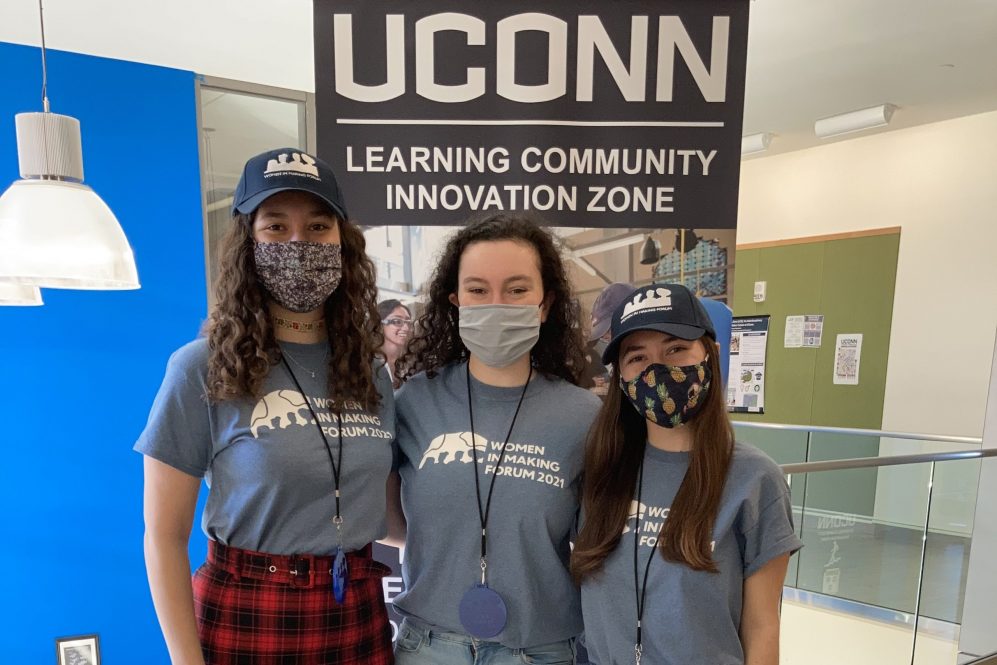Senior nutritional sciences major Eva Quigley ’22 (CAHNR) has created a novel protein bar that not only fills a market need, but also supports children in food-insecure households.
Armed with knowledge of the relationship between food and health, Quigley noticed a conspicuous absence in the protein bar market – vegetables. Vegetables are a critical part of a healthy diet and yet no bar on the market offers a full serving of vegetables while also incorporating other important nutrients such as protein and fiber.
Most bars with a vegetable component are offset with dried fruits, which increases the overall sugar content of the bar. Quigley wanted to create a simple, healthy recipe that delivered a serving of vegetables: that’s where Reach Bar comes in.
Reach Bar uses freeze-dried vegetables which smoothly incorporate into the texture of the 12-ingredient bar, containing seven grams of fiber and 11 grams of protein.
“This is how we distinguish ourselves from bars that have some vegetable component already,” Quigley says.
Quigley came up with the idea for Reach Bar with her friend Natalie Lacroix ’22 (SFA), a digital media and design major, when they were living in the Innovation House Learning Community. Innovation House helps students who have similar entrepreneurial aspirations, but different backgrounds and skills, connect and collaborate.
When Quigley and Lacroix created Reach Bar, they prioritized making charity a major part of their business plan. For every bar purchased, Reach Bar donates a meal to a child in a food-insecure home through a partnership with a Connecticut-based nonprofit.
As a nutritional science major in the College of Agriculture, Health and Natural Resources, Quigley learned how to integrate food and nutrients to promote optimal health. She was also aware of the problem of childhood hunger in America, which has been exacerbated by the COVID-19 pandemic. This led her to decide to make this the first charitable cause she wanted to tackle with Reach Bar, whose name is inspired by the creators’ desire to reach out and help people through their innovation.
“We realized our goal is to have a far-reaching impact and reach out to those in need,” Quigley says. “Child hunger was the first problem we wanted to address with Reach Bar. It’s the most immediate and we wanted to make a difference, especially during this time.”
When David Noble, director of the Peter J. Werth Institute for Entrepreneurship and Innovation, announced that a new entrepreneurial program, Get Seeded, was looking for pitches, Quigley and Lacroix decided to throw their hat into the ring. Get Seeded provides students with the opportunity to pitch their ideas to an audience of their peers and compete for up to $1,000 in seed funding.
It was a pleasant surprise when Reach Bar placed second at the Get Seeded pitching event in Fall 2020.
“Eva is about as good a person as you can hope to work with and know,” Noble says. “She has been coachable, as well as a great student. Eva, Natalie, and Reach Bar are great examples of how student entrepreneurship enhances and builds upon what is taught in the classroom, regardless of which classroom that is.”
The team presented their pitch again at the Get Seeded Demo Day this past spring, where they won first place.
“That was a really proud moment for us because it confirmed people like our idea,” Quigley says.
They are now taking part in the Connecticut Center for Entrepreneurship and Innovation’s Summer Fellowship program to continue developing their business.
Quigley and Lacroix are working with a manufacturer in California to roll out the first production run of the bars. They will distribute the bars at local grocery stores, markets, farmer’s markets, and online through Amazon.
With this first production run, they will also start user testing, which was initially delayed by the pandemic.
Quigley says as they continue to grow the business, she wants to reach out to help more organizations supporting different causes.
“As we continue to grow, we’ll hopefully be able to partner with other charities and nonprofits,” Quigley says. “We’re really open to the future.”
Follow UConn CAHNR on social media



